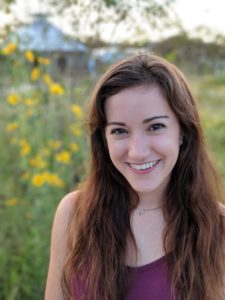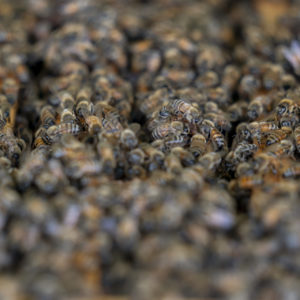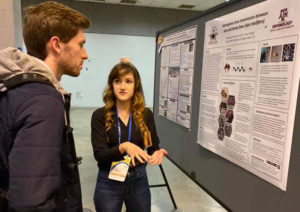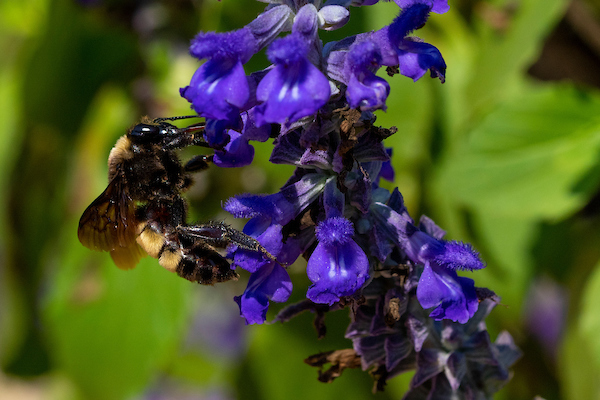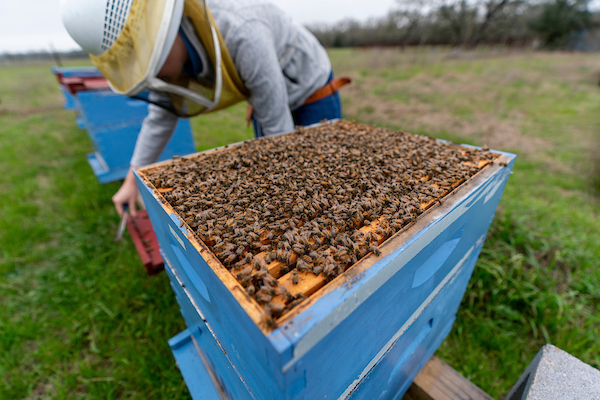Pollinating the next generation of new honeybee scientists
Alex Payne ‘21 shares the personal impact of honeybee research, motivation, academic opportunities Texas A&M University afforded her
Alex Payne, a current doctoral candidate within Texas A&M University’s Department of Entomology, didn’t always know she wanted to research honeybees. However, working in the Texas A&M Honey Bee Lab put her on a buzzing journey that would not only require her to focus on current honeybee concerns but also on research from influential Aggies before her.
Payne attended the College of Agriculture and Life Sciences for her bachelor’s degree, majoring in bioenvironmental sciences and wildlife and fisheries sciences with a wildlife ecology and conservation concentration. She is currently studying under award-winning researcher and facilitator Juliana Rangel, Ph.D., director of the Texas A&M Honey Bee Lab and professor of apiculture.
Payne sat down to discuss her experience as an Aggie and the unique role the Honey Bee Lab played to ignite her passion for Texas apiculture.
How did you decide to pursue research in entomology?
After working in plant virology labs within the Department of Plant Pathology, I decided I wanted to conduct research in a more field-based setting. In the summer of my sophomore year, I was accepted into a National Science Foundation-funded Research Experience for Undergraduates program. I was invited to conduct research with the invasive tawny crazy ant. It was an intimidating, yet amazing experience to execute my own research project in a limited amount of time. The hours were long and the Texas heat was almost unbearable, but I gained a love for field research that I had previously never been exposed to.
Due to my internship experience, I became fascinated by social insects. It was my first time working with insects, and I became immersed in the field of entomology.
You mention you began working with ants, what inspired you to work with honeybees?
I originally wanted to work in a pollinator conservation lab during my summer research internship. However, since I was not aware of whether I was allergic to bee stings, it was a potential liability. My invasive tawny crazy ant experience gave me a whole new appreciation for ants and insects in general, but I still wanted to get involved with bee research. I realized that working with bees would fulfill my desire to work toward a meaningful and impactful environmental issue.
The European honeybee is a single species whereas ants are an entire family made up of thousands of different species. Both are eusocial organisms, which is what makes them so cool to study. In places like Texas we have tons of different ant species. It is so interesting to see how these two eusocial insects interact with one another. It is what inspired the first chapter of my dissertation research,” said Honeybee researcher Alex Payne
Dr. Rangel provided me the perfect opportunity to gain experience as an undergraduate research assistant in the Honey Bee Lab. It was during this time that I became familiar with many research topics associated with honeybees by working alongside graduate students and learning of former students-turned-researchers who impacted the honeybee community. Texas A&M has so many prominent researchers, including Dr. Nevin Weaver and Dr. John Gordan Thomas, who left their mark not only on Texas apiculture but the bee community worldwide. Weaver was a Texas A&M faculty member who was instrumental in establishing Texas as a pioneering home for honeybee research.
Overall, I’ve worked in a plant virology lab, an ant lab and a honeybee lab. The skills I acquired from these three labs helped shape my dissertation and research: honeybee disease ecology.
What influenced you to continue your education at Texas A&M in the Honey Bee Lab program?
Let me first say, many encouraged me to get my doctorate at a different institution. Some researchers viewed having more than one degree from the same institution negatively. However, Texas A&M provided multiple reasons for me to stay including family, funding, research freedom and experience.
My family still lives in Spring and by staying at Texas A&M, I could continue to see them on a more regular basis than most students who were out of state. Another big reason I stayed was the experiences and opportunities I would have by working at the Honey Bee Lab. Dr. Rangel has always encouraged me to pursue research topics that interest me. These opportunities have played a major role in deciding where to continue my educational journey. Dr. Rangel has a lot of passion as a professor and is dedicated to seeing her students and research succeed.
Dr. Rangel’s lab not only offered the opportunity to conduct research, but it was evident that she was very involved in helping local beekeepers with their colonies, which is something I loved—being able to see in real-time how my efforts were helping the bees. As a result, our lab and its members are constantly involved in outreach events with stakeholders, giving talks at beekeeper meetings and even helping establish programs such as the Master Beekeeper Program.
But none of these experiences would have been possible without funding. Without that financial support, I would not have the creative research freedom I currently hold.
You mention securing funding was very important to continuing your honeybee research at Texas A&M, why is that?
While applying for graduate school, I also applied for several funding opportunities, two of which Dr. Rangel herself nominated me for. I was awarded various fellowships, which gave me six years of full funding for my doctoral program. I wouldn’t have had the same amount of financial stability or research freedom attending another university.
It’s a stressful job to juggle furthering impactful academic research while constantly having to fight for funding. The field of honeybee research is highly competitive with labs around the country competing for the same funding pools. So I’m thankful for the Nevin Weaver Honey Bee Excellence Endowment, which will enable the Texas A&M Honey Bee Lab to continue performing high-caliber research while funding future doctoral students for years to come.
The endowment exemplifies the true spirit of being an Aggie—former students helping the new generation succeed by passing it back. It’s what I strive to do daily as a senior student in the lab. I mentor new students by teaching various lab skills and beekeeping techniques, helping them adjust to college life, and having fun participating in all the Aggie traditions.
How has your experience at the Texas A&M Honey Bee Lab program changed you?
My experience in the lab, specifically with Dr. Rangel’s mentorship, has helped me become the person I am today—a confident researcher and beekeeper. I would describe my past self as timid and unsure of my abilities. Impostor syndrome is something I constantly battle, but Dr. Rangel’s influence and encouragement to put myself out there has helped me mature as a scholar. I have become a more self-confident, professional scientist and communicator. She pushed me to overcome fears such as public speaking, and I am a stronger researcher because of it.
Upon graduation, Payne is working to secure a postdoctoral position where she can diversify her skill set and continue her research studying interactions between honeybee hosts and their infectious pathogens. As she furthers her career professionally, she hopes to become a research scientist at a honeybee research facility within the U.S. Department of Agriculture’s Agricultural Research Service.
Additional information for prospective students interested in pursuing honeybee research in Texas is available through the Texas A&M Honey Bee Lab, local Texas A&M AgriLife Extension Service offices across the state, and the Texas Beekeepers Association. To learn how you can inspire students and foster opportunities for budding honeybee scientists, you can contact Jansen Merrill with the Texas A&M Foundation or the Texas Honey Bee Association.
